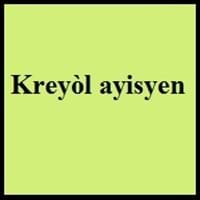German vs Haitian Creole
- One of the large group of Indo-Germanic languages is German.
- The second most popular Germanic language spoken today behind English is German language.
- In the year 1940, the first technical orthography for Haitian Creole was developed.
- In Haiian Creole, the word 'creole' is of Latin origin via a Portuguese term that means, "person raised in one's house".
German and Haitian Creole Language History
Comparison of German vs Haitian Creole language history gives us differences between origin of German and Haitian Creole language. History of German language states that this language originated in 6th Century AD whereas history of Haitian Creole language states that this language originated in 17th Century. Family of the language also forms a part of history of that language. More on language families of these languages can be found out on German and Haitian Creole Language History.
German and Haitian Creole Greetings
People around the world use different languages to interact with each other. Even if we cannot communicate fluently in any language, it will always be beneficial to know about some of the common greetings or phrases from that language. This is where German and Haitian Creole greetings helps you to understand basic phrases in German and Haitian Creole language. German word for "Hello" is hallo or Haitian Creole word for "Thank You" is Mèsi. Find more of such common German Greetings and Haitian Creole Greetings. These greetings will help you to be more confident when conversing with natives that speak these languages.
German vs Haitian Creole Difficulty
The German vs Haitian Creole difficulty level basically depends on the number of German Alphabets and Haitian Creole Alphabets. Also the number of vowels and consonants in the language plays an important role in deciding the difficulty level of that language. The important points to be considered when we compare German and Haitian Creole are the origin, speaking countries, language family, different greetings, speaking population of these languages. Want to know in German and Haitian Creole, which language is harder to learn? Time required to learn German is 30 weeks while to learn Haitian Creole time required is 24 weeks.





